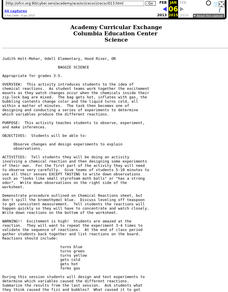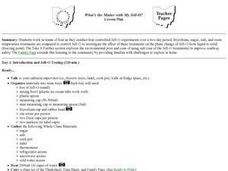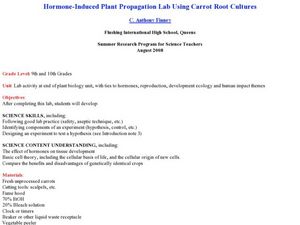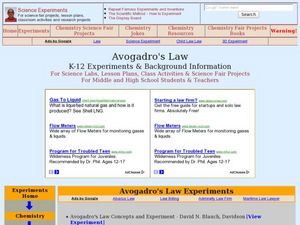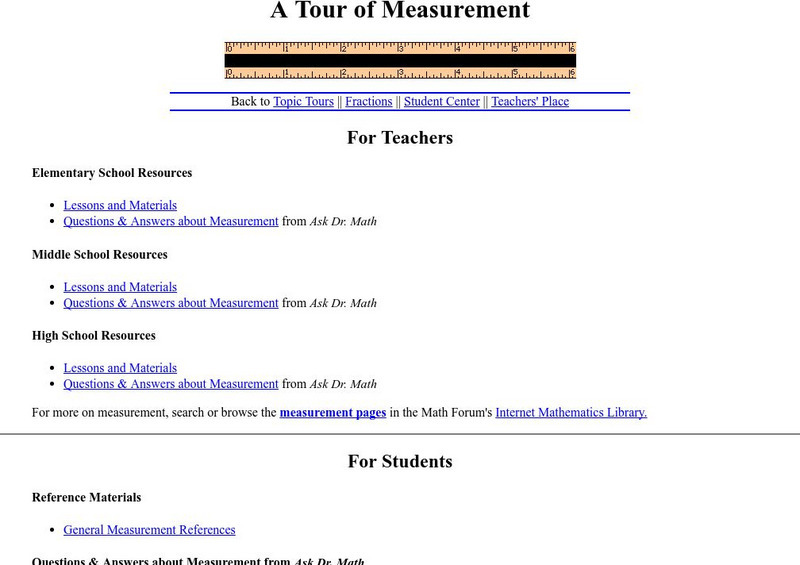Curated OER
Air Pressure
Fourth graders observe a demonstration experiment showing air pressure. They explain air pressure by completing the worksheet.
Curated OER
Solvents
For this solvents pre-lab worksheet, students describe the difference between a polar and non-polar solvent and also the dangers associated with hexanes and iodine. This worksheet has 12 short answer questions.
Curated OER
Customary Capacity
Third graders convert customary units of capacity to make a gallon man out of construction paper. They use the computer to make a tree map of gallons, quarts, pints, and cups to show these conversions.
Curated OER
Baggie Science
Students work in groups and observe chemical reactions inside zip-lock bags. They use all of their senses, except taste, to observe the reactions.
Curated OER
What is a Watershed, Anyway?
Learners constrct a watershed and write about their observations. Students use maps to locate their area in relation to the watershed and inquire about what is applied to the ground above.
Curated OER
Reading, Writing, And Math in Daily Living
Students, in groups, make chocolate chip cookies following a recipe.
Curated OER
Designing a Flotation Strategy for the Purification of Recycling
Twelfth graders work in teams to design a method of recycled plastics purification by flotation. They base their design on the concept that different kinds of plastics have different densities and keep overall costs and purification time...
Curated OER
Coefficient of Kinetic Friction and Surface Area
Students investigate coefficient of friction with respect to surface area and applied force in contact with the sliding force.
Curated OER
Cups and Cubes
Third graders explore the use of cups and counters as a model to analyze the effects of operations. They create and use a rule to create a sequential pattern and use cups and cubes to model the relationship.
Curated OER
Air Pollution: Visible And Invisible
Fourth graders observe air pollution that is visible and invisible with experimentation. During the experiment the students collect data that needs analysis. The observations are recorded in the lab journal. The data also is represented...
Curated OER
The Same But Different
Fourth graders identify the characteristics of a simple physical change. They describe objects by the properties of the materials from which they are made. Students discuss the different states of matter and their distinct physical...
Curated OER
What's the Matter with My Jell-o?
Students work in teams of four as they conduct four controlled Jell-O experiments over a two-day period. The Family Page extends this learning to the community by providing families with challenges to explore at home.
Curated OER
Let's Get To the Core!
Students practice analyzing ice core samples to discover climate changes. Using the samples, they identify and graph the gas amounts. They use these numbers to determine their effect on global warming. In pairs, they complete a...
Curated OER
Smog Be Gone
Students begin the instructional activity by identifying greenhouse gases. In groups, they observe and record the effect of the gases on the atmosphere and the temperature of the Earth. They participate in activities that describe the...
Curated OER
Hormone-Induced Plant Propagation Lab using Carrot Root Cultures
Students evaluate the importance of hormones in living things. In this biology lesson, students experiment on carrots to differentiate how humans and plants reproduce. They collect data from experiment to answer analysis questions.
Curated OER
DNA Extraction From Living Things
Students extract DNA from split peas. In this biology lesson, students hypothesize what DNA looks like and perform the experiment to verify their hypothesis. They explain the importance of DNA in living things.
Curated OER
Melting and Freezing of Water
High schoolers differentiate the three states of matter. For this chemistry lesson, students analyze graphs of heating and cooling curve of water. They complete a lab report and discuss results.
Curated OER
Avogadro's Law
Students study Avogadro's law and what it means in science. In this gaseous lesson students complete an Avogadro's law experiment.
Science Struck
Science Struck: Liquid Measurement Conversion
Provides tables showing how to convert liquid measurements used for cooking between different customary units and metric units. Covers teaspoons up to gallons, as well as conversions to milliliters.
Science Education Resource Center at Carleton College
Serc: Measuring Liquid Volume
In this lab, young scholars will measure and combine colored liquids to receive the expected results. The intended outcome would be to take primary colored liquids, measure them and combine them to create a "rainbow" colored set of water...
ibiblio
Ibiblio: How Many? A Dictionary of Units of Measurement
The Center for Mathematics and Science Education at the University of North Carolina at Chapel Hill provides an interesting and easy-to-use dictionary of the history and meaning of many measurement terms. Metric, International, and...
Science Struck
Science Struck: Liquid Measurements Chart
Provides tables showing how to convert liquid measurements used for cooking and for container labeling. Covers teaspoons up to gallons, as well as conversions to milliliters. Also explains the differences between British and American...
PBS
Pbs: Standard Measures and Conversions: Liquid Volume, Milliliters and Liters
In this Cyberchase Media Gallery, explore key concepts about liquid volume, including standard units of liquid measure and how to convert between them. In the accompanying classroom activity, students create a complete conversion chart...
National Council of Teachers of Mathematics
The Math Forum: A Tour of Measurement
Peruse a collection of lesson plans, resources and FAQ's about measurement at every grade level.
Other popular searches
- Liquid Measurement Chart G
- Liquid Measurement Chart
- Volume Liquid Measurement
- Liquid Measurement Activity
- Standard Liquid Measurement
- Liquid Measurement Tools
- Liquid Measurement in Math
- Metric Liquid Measurement
- Liquid Measurement Chart G"4
- Liquid Measurement Worksheet
- Using Liquid Measurement
- Liquid Measurement Gill





